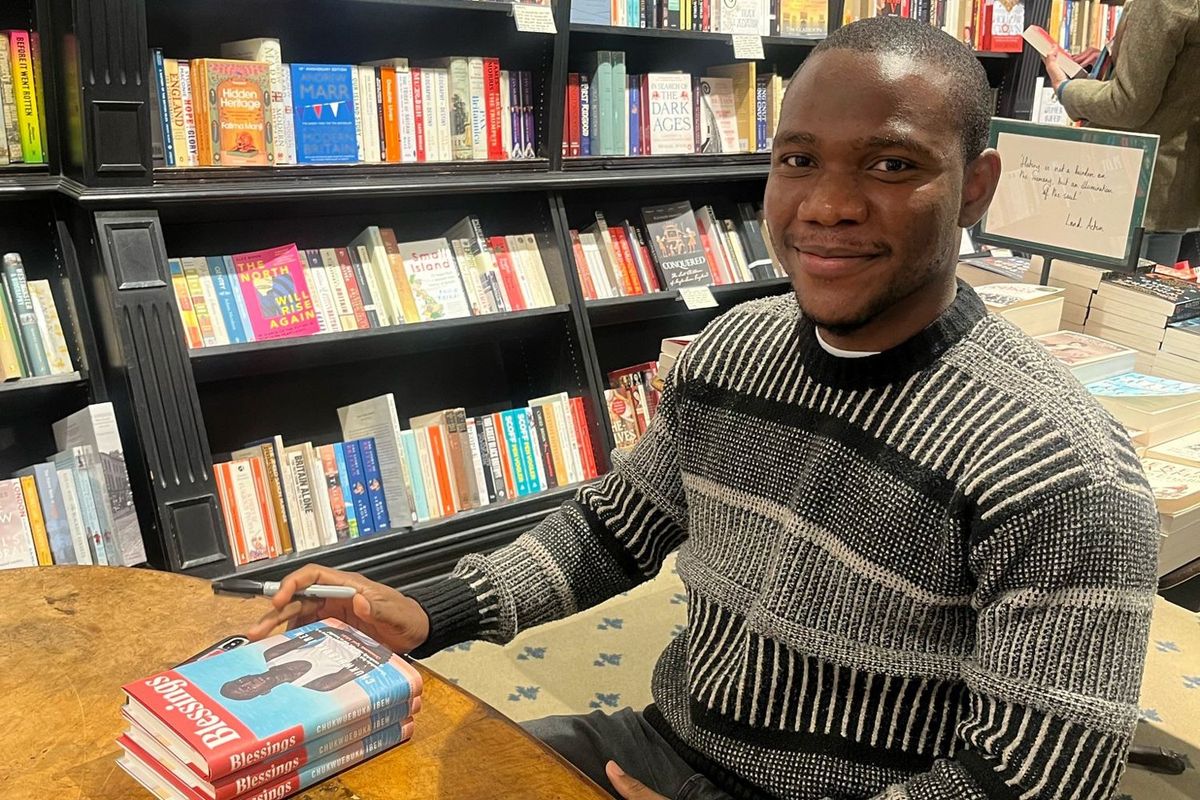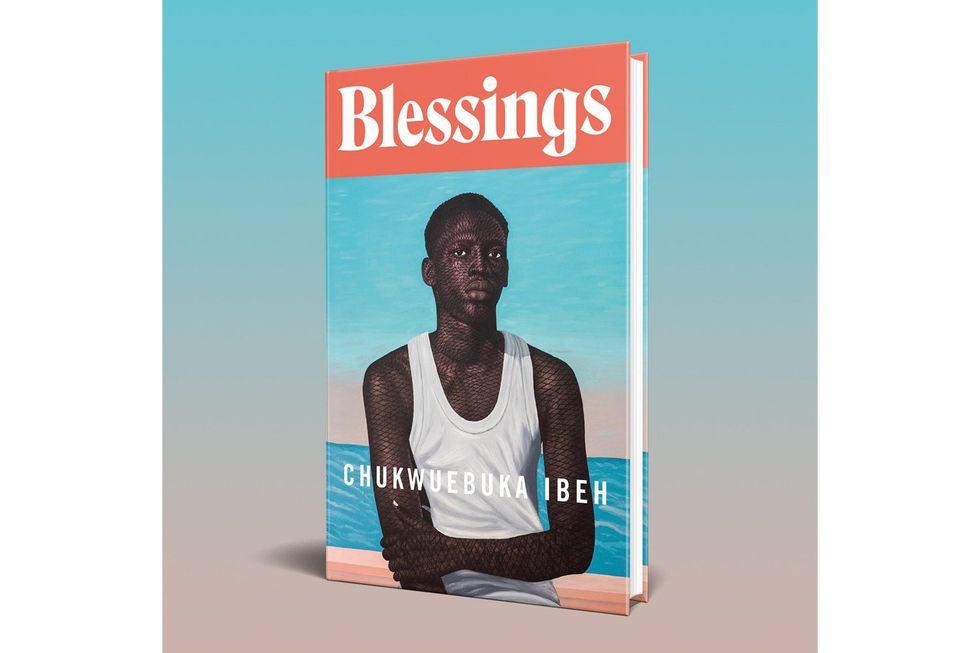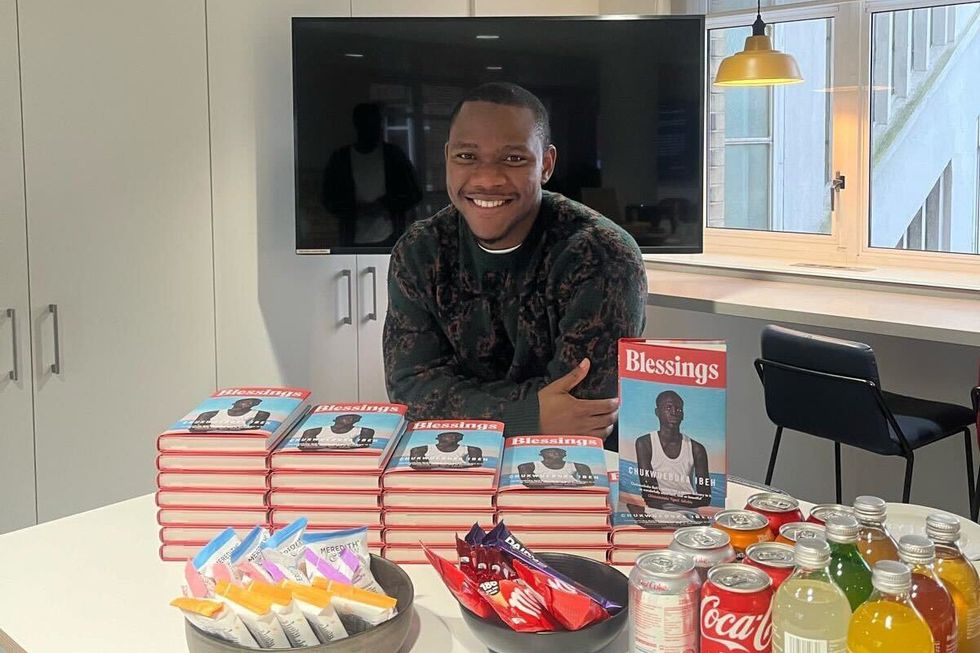How Nigerian Author Chukwuebuka Ibeh Turned Scraps of Paper Into 'Blessings,' His Debut Novel
One of Africa's rising literary stars has created a valuable addition to African queer literature — Blessings.

A photo of Chukwuebuka Ibeh sitting in a library with three copies of his book “Blessings” on the table.
An observation that lingers on the mind as one flips through the pages of Chukwuebuka Ibeh’s newly-released debut novel Blessings is that, contrary to its prominent positioning as a queer novel, the book is not simply about queerness. It is instead a story about love; the disheartening lack of it, but also the unexpected places where it is tucked away and later found. This quality makes Blessings subversive and permits it to take on known themes through fresh eyes.
Ibeh, who grew up in Port Harcourt, began writing Blessings on scraps of paper — a labor of love in itself — before typing them all onto a computer. The book opens just as the suburban, otherwise mundane life of the main character Obiefuna falls apart when his father discovers his queerness, immediately sending him off to a boarding school where he hardly knows anyone; a place where enemies and friends abound, where love and affection quickly turn sour, and where religion forces his hand towards self-loathing.
For much of the book, Obiefuna moves through life with a sense of wrongness that captures the self-rejection often experienced by queer people in spaces where queerness is openly and aggressively punished. This part of the story is interspersed with snapshots of his relationship – or lack thereof – with his mother Uzoamaka, who, in the face of a domineering husband and several life tragedies, finds herself unable to love her son as she would have liked to.
Ibeh is one of the many rising literary stars out of Africa, contributing to the canon of African queer narratives. He has studied writing with Chimamanda Ngozi Adichie, who describes his work as “wonderfully observant” and “beautiful.” In Blessings, Ibeh writes with a striking tenderness, exhibiting wisdom that tactfully moves the book through various topical conversations, including the anti-queer law — known as the Same Sex Marriage Prohibition Act 2014 (SSMPA) — with ease. This in turn makes Blessings a book filled with people whose lives, needs, desires and mistakes, quickly matter to the reader, and Ibeh, a stunning new voice.

OkayAfrica spoke to Chukwuebuka Ibeh about working on Blessings, building compelling characters and writing towards topical subjects.
This interview has been edited and condensed for length and clarity.
OkayAfrica: When did you first know, deep down, that you would write this book?
Chukwuebuka Ibeh: I was always going to write a boarding school novel. There’s so much story to be mined, in my opinion, from its structure - with the schemings and intricate power structures and complex relationships. But the most immediate prompting, you could say, was in January 2014, when the Nigerian parliament passed the ridiculous SSMPA act.
What is your memory of when the SSMPA was passed?
There’s actually an interesting story behind it. I was in boarding school in Owerri around that time. I picked up this book on current affairs and behind it was a picture of Adichie with the essay “Why can’t he be like everyone else?” which she had apparently written in response to the law. I didn’t know what law was being talked about at the time, but I, of course, loved the essay. It was actually almost a year later, back home in Port Harcourt, with internet privileges available again, that I read about it and pieced it together.
What was growing up like for you?
Very shy, religious kid who read everything he could find. The misfit no one really understood, but loved. I came from a very small, close-knit family, the middle child of three. My upbringing was pretty normal and uneventful. My family always held a lore that I was destined to change the family’s fortune which I tend to protest over in their presence, but secretly take pleasure in that vote of confidence.
What was the process of writing Blessings like?
Long hibernations. I wrote consistently all day, and repeated the action the following day. I wrote by hand on scraps of paper and then in a notebook, before typing on a computer. I almost miss those days.
What do you miss about those days?
Well, for one, the focus. I sat in front of a computer and nothing else mattered than the story, you know? There can be so much distraction for a writer — both internally and externally, and one tends to forget, occasionally, what really matters.
I do want to talk about your storytelling technique, it’s almost an economical approach to managing and dispensing language, is this a skill that has always followed you?
I am very much in the Carver-esque school of minimalism. I admire writing that captures so much in so few words, without losing its beauty. There’s a constant strive, I hope, in my writing to be just that.

One of the ironic things the SSMPA law did was usher in a wave of queer stories; why was it important for you to write about that in this book?
Because much of the law is about active erasure. And what better way to combat erasure than telling the real stories? One of the (maliciously) ignorant rhetorics put forward as a rationale or defense for the law is the recycled idea that queerness is un-African. It was important to show otherwise.
Longing is an interesting subject matter in Blessings, how did you approach using it as a recurring theme throughout the book?
It’s a theme that’s very much at the core of my writing, so it would come up inevitably, this novel perhaps more so. The characters want things and desire change at certain points of their lives. Juxtaposing that with the obvious reality that life is ultimately indiscernible makes for constant longing.
Blessings has a cinematic pacing in a way, I am curious to know if any film, if at all, guided how you paced the story.
That’s an interesting observation. I don’t know that there’s a particular movie I drew influence from, but I am generally interested in pristine scene-work, and in effective use of moments, time and transitions. These seem to be among the core of filmmaking, hence a correlation perhaps? I try to make my scenes as vivid as possible and try to pay attention to what is said at what point and what reaction is elicited when. The cinematic quality, as you put it, would be the result of that.
It’s interesting how this book touches on religion and its confliction with queerness, why was that important for you to include?
I think because Nigeria, where the novel is set, is very religious after all. And religion has always been the primary basis through which queer erasure happens. So you have the main character’s mother who loves her son but wants to live by the bible, and that creates a conflict for her that I was interested in exploring.

